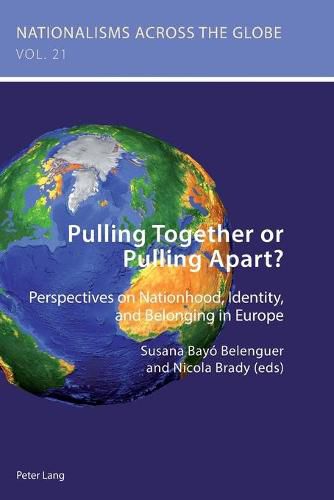Readings Newsletter
Become a Readings Member to make your shopping experience even easier.
Sign in or sign up for free!
You’re not far away from qualifying for FREE standard shipping within Australia
You’ve qualified for FREE standard shipping within Australia
The cart is loading…






This title is printed to order. This book may have been self-published. If so, we cannot guarantee the quality of the content. In the main most books will have gone through the editing process however some may not. We therefore suggest that you be aware of this before ordering this book. If in doubt check either the author or publisher’s details as we are unable to accept any returns unless they are faulty. Please contact us if you have any questions.
In the aftermath of the twentieth century’s raging warfare, attempts were made to create an environment in which new relationships between European nations could be built around a common identity. Yet, in the twenty-first century, identity conflicts are gaining a new intensity in parts of the continent. In the analysis of some sub-state nationalist parties, the prospect of European Union membership reduces the economic and political risks of secession. Meanwhile, to the east, any moves towards expansion of EU membership are viewed by Russia not as a peace project but as acts of aggression. This volume assembles a series of comparative and single-area case studies drawn from different academic disciplines. While interrogating the history of identity conflict in the European context, an essential component of efforts to reduce such conflicts in the future, the authors bring an array of methodological approaches to analyses of the many intersecting political, cultural and economic factors that influence the formation of nationhood and identity, and the resurgence of nationalism.
$9.00 standard shipping within Australia
FREE standard shipping within Australia for orders over $100.00
Express & International shipping calculated at checkout
This title is printed to order. This book may have been self-published. If so, we cannot guarantee the quality of the content. In the main most books will have gone through the editing process however some may not. We therefore suggest that you be aware of this before ordering this book. If in doubt check either the author or publisher’s details as we are unable to accept any returns unless they are faulty. Please contact us if you have any questions.
In the aftermath of the twentieth century’s raging warfare, attempts were made to create an environment in which new relationships between European nations could be built around a common identity. Yet, in the twenty-first century, identity conflicts are gaining a new intensity in parts of the continent. In the analysis of some sub-state nationalist parties, the prospect of European Union membership reduces the economic and political risks of secession. Meanwhile, to the east, any moves towards expansion of EU membership are viewed by Russia not as a peace project but as acts of aggression. This volume assembles a series of comparative and single-area case studies drawn from different academic disciplines. While interrogating the history of identity conflict in the European context, an essential component of efforts to reduce such conflicts in the future, the authors bring an array of methodological approaches to analyses of the many intersecting political, cultural and economic factors that influence the formation of nationhood and identity, and the resurgence of nationalism.